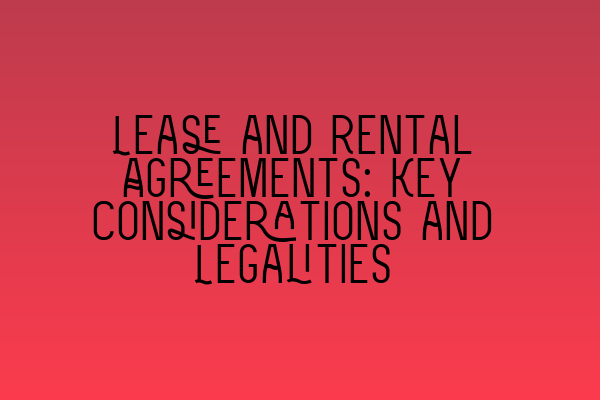Lease and Rental Agreements: Key Considerations and Legalities
Lease and rental agreements are essential documents that govern the relationship between landlords and tenants. Whether you are a property owner looking to lease your space or a tenant searching for the perfect rental, understanding the key considerations and legalities involved is crucial to protect your rights and interests.
1. Importance of a Written Agreement
A written lease or rental agreement is the foundation of a secure and transparent landlord-tenant relationship. It provides both parties with a clear understanding of their rights and responsibilities. From rent payment terms to maintenance obligations and dispute resolution mechanisms, a well-drafted agreement ensures that everyone is on the same page.
When drafting a lease or rental agreement, it is important to include all key terms and conditions, such as:
- Rental duration: Clearly specify the start and end dates of the tenancy.
- Security deposit: Outline the amount required and the conditions for its refund.
- Rent payment: State the amount, due date, and preferred payment methods.
- Utilities and maintenance: Define who is responsible for paying and maintaining utilities and common areas.
- Termination and renewal: Detail the notice period required for termination or renewal.
2. Tenant Rights and Protections
Tenants have specific legal rights and protections, ensuring they are not taken advantage of by landlords. It is vital for tenants to be aware of their rights, which may include:
- Right to a habitable property: Ensures that the tenant has a safe and livable space.
- Privacy rights: Landlords must respect tenants’ privacy and provide reasonable notice before entering the property.
- Protection against discrimination: It is illegal for landlords to discriminate against tenants based on their race, religion, gender, or disability.
- Security deposit regulations: Landlords must follow specific procedures for collecting and refunding security deposits.
- Protection against unfair eviction: Tenants are entitled to a proper eviction process, which varies by jurisdiction.
- Maintaining the property: Landlords must keep the rental property in a habitable condition, ensuring repairs are made promptly.
- Respecting privacy: Landlords should not intrude on a tenant’s privacy without proper notice, except in emergencies.
- Adhering to anti-discrimination laws: Landlords must not discriminate against potential tenants or treat them differently based on protected characteristics.
- Return of security deposits: Landlords must return the security deposit within the legally required timeframe, minus any legitimate deductions.
- Providing necessary disclosures: Landlords should inform tenants of any known defects or hazardous conditions in the property.
3. Landlord Responsibilities
While tenants have rights, landlords also have specific responsibilities to ensure a fair and respectful relationship. Some of the key obligations of landlords include:
4. Legal Remedies and Dispute Resolution
Despite best intentions, conflicts may arise between landlords and tenants. In such cases, understanding the available legal remedies and dispute resolution mechanisms is crucial. Some common methods of resolving disputes include negotiation, mediation, and litigation.
Seeking legal advice from a qualified contract law solicitor can help ensure your rights and interests are protected throughout the dispute resolution process.
5. Seek Professional Assistance
When it comes to lease and rental agreements, seeking professional assistance is highly recommended. A knowledgeable contract law solicitor can provide valuable advice, review agreements, and guide you through the legal complexities. This helps prevent potential legal pitfalls and ensures a smooth landlord-tenant relationship.
In conclusion, lease and rental agreements are vital documents that establish the terms and conditions of a landlord-tenant relationship. With a well-drafted agreement and a clear understanding of legal rights and responsibilities, both parties can enjoy a harmonious and mutually beneficial arrangement.
If you are in need of legal assistance with lease and rental agreements or have any questions, contact SQE Contract Law today. Our team of experienced solicitors is ready to assist you.
